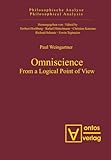Omniscience : From a Logical Point of View / Paul Weingartner.
Material type: TextSeries: Philosophische Analyse / Philosophical Analysis ; 23Publisher: Berlin ; Boston : De Gruyter, [2013]Copyright date: ©2008Description: 1 online resource (188 p.)Content type:
TextSeries: Philosophische Analyse / Philosophical Analysis ; 23Publisher: Berlin ; Boston : De Gruyter, [2013]Copyright date: ©2008Description: 1 online resource (188 p.)Content type: - 9783110326697
- 9783110327090
- 200
- BT131
- online - DeGruyter
- Issued also in print.
| Item type | Current library | Call number | URL | Status | Notes | Barcode | |
|---|---|---|---|---|---|---|---|
 eBook
eBook
|
Biblioteca "Angelicum" Pont. Univ. S.Tommaso d'Aquino Nuvola online | online - DeGruyter (Browse shelf(Opens below)) | Online access | Not for loan (Accesso limitato) | Accesso per gli utenti autorizzati / Access for authorized users | (dgr)9783110327090 |
Browsing Biblioteca "Angelicum" Pont. Univ. S.Tommaso d'Aquino shelves, Shelving location: Nuvola online Close shelf browser (Hides shelf browser)

|

|

|

|

|

|

|
||
| online - DeGruyter Ontology and Analysis : Essays and Recollections about Gustav Bergmann / | online - DeGruyter Persistence / | online - DeGruyter Body, Mind and Self in Hume’s Critical Realism / | online - DeGruyter Omniscience : From a Logical Point of View / | online - DeGruyter Tropes, Universals and the Philosophy of Mind / | online - DeGruyter Substantia - Sic et Non / | online - DeGruyter Mind: Ontology and Explanation : Collected Papers 1981-2005 / |
Frontmatter -- Preface -- Contents -- 1. Whether Everything is True What God Knows -- 2. Whether God Necessarily Knows Whatever He Knows -- 3. Whether God Knows Something at Some Time -- 4. Whether God Knows All Past and Present Events -- 5. Whether God's Knowledge Exceeds His Power -- 6. Whether God Causes Everything What He Knows -- 7. Whether God Knows Singular Truths? -- 8. Whether God's Knowledge of Singular, Contingent Truths Implies the Mutability of God -- 9. Whether God Knows What Is Not. -- 10. Whether Knowledge or Truth Can Change the Status of a State of Affairs -- 11. Whether God Knows Future States of Affairs -- 12. Whether God Knows Everything That is True -- 13. A Theory of Omniscience -- LITERATURE -- Subject Index -- Name Index -- Backmatter
restricted access online access with authorization star
http://purl.org/coar/access_right/c_16ec
The aim of the book is to clarify the concept of omniscience. This is done first by discussing basic questions on omniscience (chs.1-12) and secondly by offering a theory of omniscience as an axiomatic system in which also a definition of omniscience is given (ch.13). The twelve chapters deal with questions like whether everything is true what God knows, whether God´s knowledge is bound to time, whether it concerns singular truths or only laws, whether it extends also to contingent future events.etc. The book is neither a book about the existence of God nor about proofs for his existence. It is a book about the possibility of a consistent concept of omniscience which can be attributed to God. And it invalidates opposite claims and shows that they are based on wrong or very doubtful premises. The pros and cons at the beginning of each chapter represent different positions and objections which are clarified and discussed in the answer to the objections.
Issued also in print.
Mode of access: Internet via World Wide Web.
In English.
Description based on online resource; title from PDF title page (publisher's Web site, viewed 28. Feb 2023)


